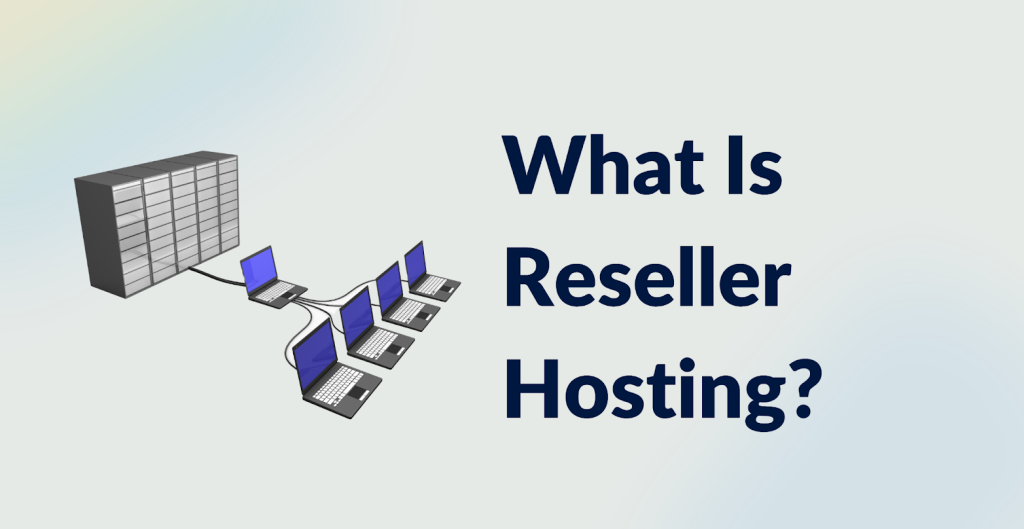Table of Contents
Thinking of starting your web hosting business? Reseller Web Hosting is easy to start, manage, and a profitable business venture. However, if you’re new these words might sound gibberish to you, but we’re here to help!
Let’s jump right into knowing what reseller hosting is, the features, and how it works.
What is Reseller Hosting?

Reseller web hosting involves a hosting provider renting a server and its resources like hard drive space, RAM, CPU, and bandwidth to other small-size businesses. These small-size businesses who rent parts of that space to third parties are called resellers.
In simple words, you provide web hosting to your clients (out of the larger space that you have bought from a hosting provider) as if you are the web hosting company. This is a great option for aspiring entrepreneurs who want to start their own web hosting company or for current web designers and developers who desire to add additional services to their brands.
Types Of Reseller Hosting
- Linux Reseller Hosting:
- This type of reseller hosting is based on Linux servers.
- It supports scripting languages such as PHP, Perl, and MySQL databases.
- Linux reseller hosting is often more affordable and stable.
- Windows Reseller Hosting:
- This type of reseller hosting is based on Windows servers.
- It supports technologies such as ASP.NET, Microsoft SQL Server, and Windows-specific applications.
- Windows reseller hosting is suitable for businesses that require Windows-based technologies.
- cPanel Reseller Hosting:
- cPanel is a popular control panel used in many web hosting environments.
- Resellers with cPanel access can easily manage their hosting accounts, create packages, and provide clients with a user-friendly interface.
- Plesk Reseller Hosting:
- Plesk is another widely used control panel.
- Plesk reseller hosting allows users to manage hosting accounts and websites efficiently.
- Cloud Reseller Hosting:
- Cloud reseller hosting is based on cloud infrastructure, providing scalability and flexibility.
- Resources can be easily scaled up or down based on demand.
How Does Reseller Hosting Work?

Reseller hosting works on a straightforward model where an individual or company (the reseller) purchases hosting resources from a larger hosting provider and then resells these resources to their own clients. Here’s a step-by-step overview of how reseller hosting typically works:
- Selecting a Hosting Provider: The reseller begins by choosing a reputable hosting provider. This provider is often a larger company with the necessary infrastructure, servers, and technical support. The reseller should consider factors like server reliability, customer support, and the range of features offered by the hosting provider.
- Choosing a Reseller Hosting Plan: The reseller selects a reseller hosting plan from the hosting provider. This plan typically includes a specific amount of disk space, bandwidth, and other resources that the reseller can allocate to their individual hosting accounts.
- Customizing Hosting Plans: Resellers have the flexibility to customize hosting plans based on their target market and client needs. They can set their own pricing, define the features included in each plan, and even brand the hosting services with their own company name and logo.
- Allocating Resources: Once the reseller has purchased the hosting plan, they can allocate the resources among their clients. This involves creating individual hosting accounts for each client and assigning the appropriate amount of disk space, bandwidth, and other resources to meet their specific requirements.
- Branding and Customer Support: Resellers often have the option to brand the hosting services with their own identity, providing a white-label solution. They are responsible for managing customer relationships, providing front-end customer support, and handling billing and invoicing.
- Selling Hosting Services: With their customized plans and branded services, resellers can start selling hosting services to their clients. They may use various marketing strategies to attract customers, such as advertising, promotions, or word-of-mouth referrals.
- Managing Clients: Resellers are responsible for managing their clients, handling inquiries, providing customer support, and ensuring the smooth operation of the hosting services. While they manage the front-end aspects of the business, the hosting provider takes care of the server infrastructure and technical support.
- Scaling Operations: As the reseller’s business grows, they can easily scale their operations by purchasing additional hosting resources from the provider. This scalability allows resellers to accommodate more clients and expand their service offerings.
Benefits of Reseller Hosting

Reseller hosting offers several benefits for individuals and businesses looking to enter the hosting industry or expand their service offerings. Some of the key advantages include:
- Low Entry Cost: Reseller hosting allows individuals and small businesses to enter the hosting market without the significant upfront costs associated with building and maintaining server infrastructure. The initial investment is typically lower compared to starting a hosting business from scratch.
- No Infrastructure Management: Resellers don’t have to worry about managing server hardware, data centers, or the technical aspects of hosting. The hosting provider takes care of server maintenance, security, and infrastructure management, allowing resellers to focus on customer acquisition and support.
- Custom Branding: Resellers have the flexibility to brand the hosting services with their own company name and logo. This creates a more professional and cohesive image for their business and helps in building brand recognition.
- Flexible Plans and Pricing: Resellers can create and customize their own hosting plans, tailoring them to the specific needs of their clients. This flexibility in pricing and plans allows resellers to target different market segments and offer a range of services.
- Revenue Generation: Reseller hosting provides an opportunity for individuals and businesses to generate revenue by selling hosting services. Resellers earn a profit by charging their clients for the hosting resources and services they provide.
- Scalability: As the reseller’s business grows, they can easily scale their operations by purchasing additional hosting resources from the provider. This scalability allows resellers to accommodate more clients and expand their hosting offerings.
- Technical Support: Hosting providers often offer technical support to resellers, handling server-related issues and ensuring the infrastructure runs smoothly. This allows resellers to focus on customer support and other aspects of their business.
- Diverse Service Portfolio: Resellers can offer a variety of services beyond basic web hosting, such as domain registration, email hosting, and other related services. This diversification can attract a broader range of clients.
Server Management and Control Panels
Effective server management is at the core of reseller hosting.
Here’s how it works:
Control Panel Access: Reseller hosting providers usually grant resellers access to a control panel. This control panel is a user-friendly interface that allows you to manage hosting accounts, configure server settings, and perform various administrative tasks.
Client Account Creation: Using the control panel, you can create individual hosting accounts for your clients. These accounts are like separate compartments on the server, each with its own resources and configurations.
Resource Allocation: The control panel enables you to allocate server resources to each client account. You can set limits on disk space, bandwidth, email accounts, and other resources based on your clients’ needs and hosting packages.
Customization: Reseller hosting control panels often allow for customization. You can tailor the control panel’s appearance to match your branding and create a consistent user experience for your clients.
Client Support: The control panel provides tools for managing client support, such as ticket systems and knowledge bases. This ensures efficient communication and assistance for your clients.
Monitoring and Maintenance: You can monitor server health, resource usage, and client accounts through the control panel. This visibility helps you proactively address issues and ensure optimal performance for your clients.
Conclusion
In the ever-evolving landscape of the internet, reseller hosting stands as a gateway for individuals and businesses to enter the hosting industry, offering a blend of flexibility, customization, and profit potential. By bridging the gap between hosting providers and end-users, resellers play a crucial role in delivering hosting solutions tailored to the diverse needs of website owners.
